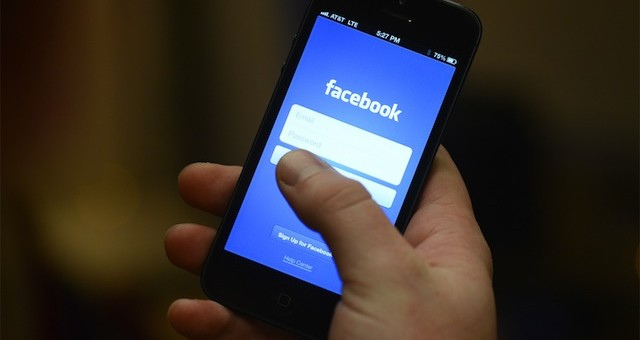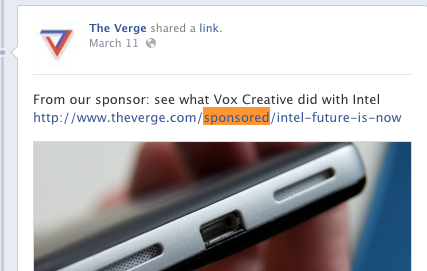Last chance to save on Digiday Publishing Summit passes is February 9

Facebook has a clear policy prohibiting brands from publishing advertising on their pages, but things get murkier when ads take the form of sponsor content.
In that case, Facebook’s policy is live and let live. That has led to a bit of Wild West when it comes to how publishers treat sponsor content distributed on Facebook. Some, like BuzzFeed and The New York Times, don’t distribute their sponsor content through their pages. Others, like Vox Media and Gothamist, label it as “sponsored” in the link description. Still others, like Forbes, label such content more obscurely. Here’s a post for sponsor content from insurance company Northwestern Mutual.
 “The content is clearly marked with the headline prepend such as NetAppVoice: plus HEADLINE. We do the same on Twitter,” said Mia Carbonell, vp of communications at Forbes.
“The content is clearly marked with the headline prepend such as NetAppVoice: plus HEADLINE. We do the same on Twitter,” said Mia Carbonell, vp of communications at Forbes.
Compare that with the disclosure methods of Vox Media, which are more direct (below). “We want to be super transparent with our readers about when content is from a sponsor. If people feel like they were tricked into viewing something, we’re only hurting ourselves. Thus, ‘From our sponsor’ is nice, human-sounding language,” said Chad Mumm, creative director at Vox Media.
While the situation is murky for readers, Facebook itself is fine with publishers posting sponsor content, arguing that a publisher that spams people with advertorial will end up losing followers because of it. There’s a self-policing aspect to the voluntary nature of the Facebook like, after all.
“If you post advertorial content from your own site on your own Facebook Page, then that’s not an issue,” said Facebook spokesman Tim Rathschmidt.
Facebook is not alone in taking a lax approach to sponsor content. Twitter also has a hands-off approach with publishers using their Twitter feeds for promotion. The Associated Press last year began pushing out sponsor messages in tweets, and Twitter said they aren’t in violation of its rules so long as they follow FTC disclosure guidelines.
As Facebook and Twitter become larger parts of distribution for publishers, it potentially becomes a powerful distributor of sponsor content. Publishers like BuzzFeed, for example, already buy Facebook ads specifically for its sponsor content. What BuzzFeed doesn’t do, however, is post that sponsored content on its Facebook. Instead, the company, like The Washington Post, has created a separate page dedicated to the content.
“This is run by the business side of the house. It’s about the separation of church and state,” said Ashley McCollum, vp of communications at BuzzFeed.
The downside of pushing out sponsor content through a separate page is reach. The Washington Posts WP Studio page has 88 likes, a far cry from 1.8 million likes its main Facebook page has. In a similar vein, the BuzzFeed Partner Facebook page has 167,000 likes, far fewer than the 1.9 million its regular Facebook page has. So neither publisher is getting much organic reach out of these secondary accounts.
The Federal Trade Commission has shown an interest in making sure sponsor content is labeled properly. At hearings in December focused on native advertising, FTC officials spent much of its time discussing labeling practices.
Facebook, on the other hand, is less concerned. Its laissez-faire position towards sponsored content is very different from that of Google, which said last year that publishers had to separate sponsored posts from editorial content if they wanted to be included in Google News results. Publishers are instructed to insert “no follow” tags in sponsor posts to tell Google to exclude them from its index.
More in Media

In Graphic Detail: The scale of the challenge facing publishers, politicians eager to damage Google’s adland dominance
Last year was a blowout ad revenue year for Google, despite challenges from several quarters.

Why Walmart is basically a tech company now
The retail giant joined the Nasdaq exchange, also home to technology companies like Amazon, in December.

The Athletic invests in live blogs, video to insulate sports coverage from AI scraping
As the Super Bowl and Winter Olympics collide, The Athletic is leaning into live blogs and video to keeps fans locked in, and AI bots at bay.






